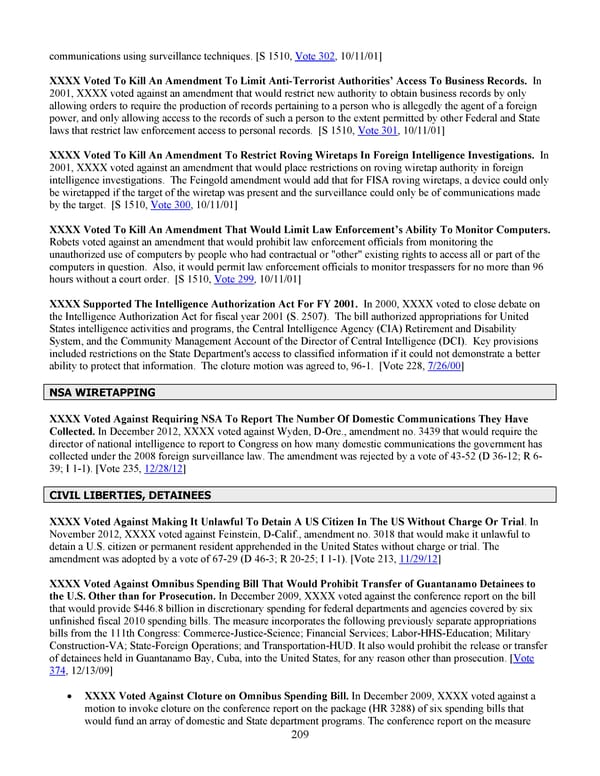communications using surveillance techniques. [S 1510, Vote 302, 10/11/01] XXXX Voted To Kill An Amendment To Limit Anti-Terrorist Authorities’ Access To Business Records. In 2001, XXXX voted against an amendment that would restrict new authority to obtain business records by only allowing orders to require the production of records pertaining to a person who is allegedly the agent of a foreign power, and only allowing access to the records of such a person to the extent permitted by other Federal and State laws that restrict law enforcement access to personal records. [S 1510, Vote 301, 10/11/01] XXXX Voted To Kill An Amendment To Restrict Roving Wiretaps In Foreign Intelligence Investigations. In 2001, XXXX voted against an amendment that would place restrictions on roving wiretap authority in foreign intelligence investigations. The Feingold amendment would add that for FISA roving wiretaps, a device could only be wiretapped if the target of the wiretap was present and the surveillance could only be of communications made by the target. [S 1510, Vote 300, 10/11/01] XXXX Voted To Kill An Amendment That Would Limit Law Enforcement’s Ability To Monitor Computers. Robets voted against an amendment that would prohibit law enforcement officials from monitoring the unauthorized use of computers by people who had contractual or "other" existing rights to access all or part of the computers in question. Also, it would permit law enforcement officials to monitor trespassers for no more than 96 hours without a court order. [S 1510, Vote 299, 10/11/01] XXXX Supported The Intelligence Authorization Act For FY 2001. In 2000, XXXX voted to close debate on the Intelligence Authorization Act for fiscal year 2001 (S. 2507). The bill authorized appropriations for United States intelligence activities and programs, the Central Intelligence Agency (CIA) Retirement and Disability System, and the Community Management Account of the Director of Central Intelligence (DCI). Key provisions included restrictions on the State Department's access to classified information if it could not demonstrate a better ability to protect that information. The cloture motion was agreed to, 96-1. [Vote 228, 7/26/00] NSA WIRETAPPING XXXX Voted Against Requiring NSA To Report The Number Of Domestic Communications They Have Collected. In December 2012, XXXX voted against Wyden, D-Ore., amendment no. 3439 that would require the director of national intelligence to report to Congress on how many domestic communications the government has collected under the 2008 foreign surveillance law. The amendment was rejected by a vote of 43-52 (D 36-12; R 6- 39; I 1-1). [Vote 235, 12/28/12] CIVIL LIBERTIES, DETAINEES XXXX Voted Against Making It Unlawful To Detain A US Citizen In The US Without Charge Or Trial. In November 2012, XXXX voted against Feinstein, D-Calif., amendment no. 3018 that would make it unlawful to detain a U.S. citizen or permanent resident apprehended in the United States without charge or trial. The amendment was adopted by a vote of 67-29 (D 46-3; R 20-25; I 1-1). [Vote 213, 11/29/12] XXXX Voted Against Omnibus Spending Bill That Would Prohibit Transfer of Guantanamo Detainees to the U.S. Other than for Prosecution. In December 2009, XXXX voted against the conference report on the bill that would provide $446.8 billion in discretionary spending for federal departments and agencies covered by six unfinished fiscal 2010 spending bills. The measure incorporates the following previously separate appropriations bills from the 111th Congress: Commerce-Justice-Science; Financial Services; Labor-HHS-Education; Military Construction-VA; State-Foreign Operations; and Transportation-HUD. It also would prohibit the release or transfer of detainees held in Guantanamo Bay, Cuba, into the United States, for any reason other than prosecution. [Vote 374, 12/13/09] XXXX Voted Against Cloture on Omnibus Spending Bill. In December 2009, XXXX voted against a motion to invoke cloture on the conference report on the package (HR 3288) of six spending bills that would fund an array of domestic and State department programs. The conference report on the measure 209
 HRC vote skeleton Page 223 Page 225
HRC vote skeleton Page 223 Page 225